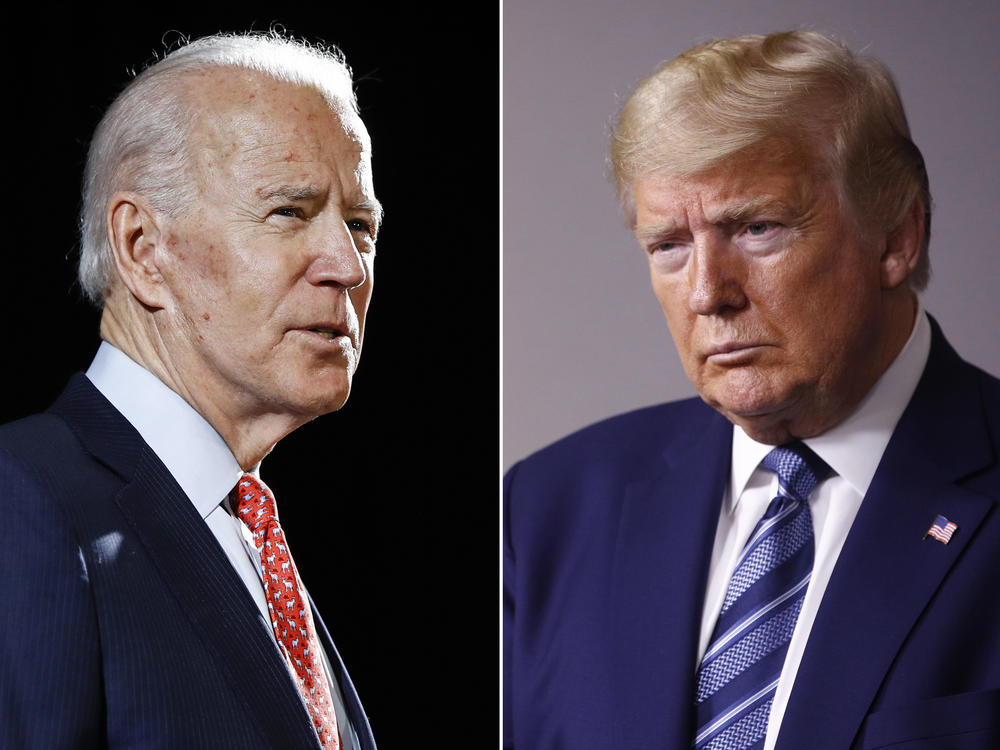Loading...
Section Branding
Header Content
Trump's advantages are huge in the 2024 GOP primary right now
Primary Content
For anyone to defeat former President Trump in the Republican primary, they are going to have to overcome the significant advantages he has with key pillar GOP voter groups, the latest NPR/PBS NewsHour/Marist poll finds.
Despite, or perhaps because of, his legal problems, Republican primary voters continue to say they like Trump — better than anyone in the field. And any argument that he is too weak a candidate to win a general election doesn't appear to hold much water with the party faithful.
Almost two-thirds say they would rather have a candidate who stands on principle than has the best chance to defeat President Biden.
On the Democratic side, Biden is significantly better liked than the token opposition he faces, and he has seen his approval rating stabilize. He still faces challenges with independents and younger voters, however — key groups for his reelection fortunes.
Trump and DeSantis are the most liked in the GOP primary
Potential Republican primary voters like Trump and former Florida Gov. Ron DeSantis by a much wider margin than any other candidates to this point.
- Trump gets a 76%-to-19% favorability rating, topping the field. DeSantis is not far behind with a 67%-to-15% rating.
But Trump has huge advantages with rural voters, white evangelical Christians, GOP women, those without college degrees and those who make less than $50,000 a year.
DeSantis, on the other hand, has decidedly smaller edges with college-educated Republicans, GOP men and voters who live in cities and suburbs.
- The only other candidate in the primary to reach a 50% rating is South Carolina Sen. Tim Scott. Scott has spent or booked $4.6 million in ads so far, according to data compiled by the ad-tracking firm AdImpact and shared with NPR, which may be helping with his visibility in early nominating states like Iowa.
- Former South Carolina Gov. Nikki Haley's negative ratings have almost doubled since getting in the race.
- Former Vice President Pence has not worn well since entering the race. He's gone from a net-positive rating of +21 in February to just +4 now.
- Former Arkansas Gov. Asa Hutchinson and former New Jersey Gov. Chris Christie are the least liked in the field, meaning the least-liked candidates are the ones who have been most outspoken in criticizing Trump.
Republicans want a nominee who stands on principle
- By a 63%-to-35% margin, Republicans and Republican-leaning independents said they want a nominee who will stand on conservative principles, as opposed to someone with the best chance of beating President Biden.
- That presents a problem for candidates who want to dislodge Trump as a front-runner and are making the argument that he can't win and has an electability problem.
Biden's approval rating has leveled off
- Biden gets a 45% approval rating among all adults and 47% with registered voters.
- He has a very solid 86% approval with Democrats, does best with women holding college degrees (60%), people who live in big cities (58%) and nonwhites (56%).
- But there are continued warning signs for him with independents and younger Americans, age 18 to 29. Both groups give him just a 38% approval rating.
Biden liked best in Democratic field
- Biden has the highest favorability ratings of those running in the Democratic primary. Biden gets an 83% favorable rating among Democrats and Democratic-leaning independents.
- Potential Democratic primary voters are split or undecided on Robert F. Kennedy Jr., who gets a 35%-to-34% rating.
- Self-help author Marianne Williamson is largely unknown despite running in 2020 — 59% say they're unsure or never heard of her, while 23% have an unfavorable view of her and just 18% have a positive one.
Copyright 2023 NPR. To see more, visit https://www.npr.org.

